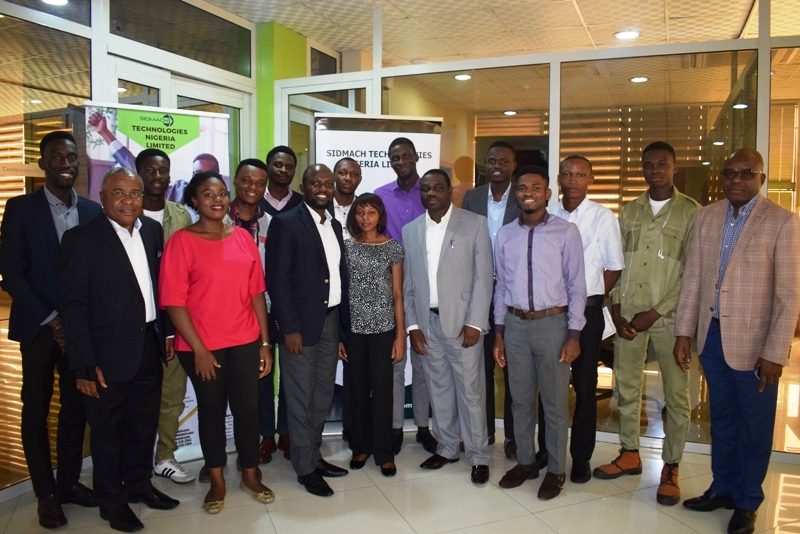Telecom
Sidmach Graduates First Set of its AppFactory Graduate Interns

It was a joyous moment as the famous indigenous software company, Sidmach Technologies Nigeria Limited, graduated the first set of graduate interns under its Sidmach AppFactory Program which runs like a software academy.
The Sidmach AppFactory shares same objective and value with the Microsoft AppFactory, which is to improve the state of software development in Africa.
The aim of this initiative is to improve software development through an internship program meant to take talented and passionate young people and give them the chance to harness and develop excellent software development skills.
A total of 12 fresh university graduates participated in the six months programmes; an offshoot of Microsoft App Factory initiative.
Speaking at the ceremony held at its head office in Lagos, the Managing Director of Sidmach, Mr. Peter Arogundade, said although they embraced the Microsoft initiative as part of a measure to assist young graduates to become better equipped to face the world of entrepreneurship.
Mr. Arogundade described App Factory as a wonderful platform to learn, unlearn and relearn; garner knowledge, skills and become competitive.
“Sidmach is always looking out for opportunities to add value in the lives of young Nigerians and startups.
“That is why we keyed-in to the Microsoft App Factory initiative. It is true that most Nigerian graduates lack the prerequisite practical knowledge, skills and agility to face their counterparts in other part of the world, however, it is high time, as a country, we stopped blaming them, rather provide platforms for them to get equipped to succeed.
“On the other hand, the gap between the industry and the academia is so wide, but with programmes like this it can be addressed.
“Today, the 12 interns are tested and certified in software development and other softskills that will help them succeed and they are not leaving the doors of Sidmach; they will stay back and work with us in developing solutions for different sectors like education, health, finance, agriculture, amongst others”.
Mr. Chijioke Eke, Co-founder and Chairman, Sidmach Technologies Nigeria Limited, Expatiating on Sidmach’s interest in the App Factory programme, regretted that most universities (in Nigeria) are still trapped in the old theories and practical apparatuses thereby denying the students adequate knowledge for 21stCentury application development.
“Sidmach ventured into this internship that is practical oriented to assist the fresh graduates to overcome some constraints”, he said.
He urged the interns to make the best use of the knowledge they garnered during the six-months training. “As you match on to the future of development of solutions, professionalism and value additions lie on your shoulders.
“There must be something different between you who are now practical-oriented and those still trapped in the web of theories.
“The future of our country, the citizens and indeed the world depends on you as app developers.
“I want to re-echo the MD’s statement that you are not leaving the doors of Sidmach.
We are retaining you and will strengthen the Academy to assist more graduates,” Mr. Eke said.
The Chairman who showered encomiums on Microsoft for initiating the programme, also called for further investments in youth development as a panacea to unemployment and restiveness.
Ade Ajayi, Director Marketing and Operations, Microsoft Nigeria, Commenting about the Academy, said that Microsoft exists because it believes in the relevance of developers to impact the world economy. “We believe developers can change the world with the keyboard and their ten fingers.
“Microsoft recently acquired GitHub which is in the developer platform.
“The point is that developers will continue to change the world. So, every intern who passes through the App Factory internship programme should take it very serious,” he said.
“Sidmach bought into the idea and Microsoft is happy to have partners like Sidmach which is among the top one thousand partners we have in Nigeria”.
He hinted on Microsoft’s plans to double the commitments to App Factory.
Telecom
Mart Networks Rolls Out Tailored Cybersecurity Solution for Fintechs

Mart Networks, a leading cybersecurity distributor across Africa and the Middle East, has unveiled a specialized cybersecurity package tailored for fintech firms.

The solution, powered by Invinsense, Infopercept’s unified cybersecurity platform, aims to address the growing security needs of fintechs operating in highly regulated environments.
According to Moiz Maloo, Managing Director at Mart Networks, fintech companies face unique security challenges due to stringent regulatory requirements and increasing threats. “Most fintechs don’t have the luxury of multiple internal security teams or system integrators. With this focused offering, we’re providing an all-in-one platform with managed services built specifically for the fintech environment,” he said.
The offering integrates four key components: Invinsense XDR and Managed Detection & Response for real-time monitoring, Exposure Management for vulnerability detection, Security Compliance Management to support fintechs in meeting regulatory standards, and Cybersecurity Awareness Programs to empower teams against cyber threats.
Furthermore, the package includes deep application visibility, ensuring fintech-specific applications remain secure through Invinsense SIEM’s custom log ingestion capabilities. To reinforce protection, Infopercept’s engineering team will provide code-level fixes, patches, and infrastructure security enhancements.
With the rise of cloud-based fintech operations, the solution also incorporates full-stack cloud security, including API security, Cloud Infrastructure Entitlement Management (CIEM), and Application Security Posture Management (ASPM).
Mart Networks’ move underscores the growing importance of cybersecurity in Africa’s fintech sector, as financial services become increasingly digital and susceptible to evolving cyber threats.
Telecom
Equinix Expands Digital Footprint in Nigeria with Launch of LG2.3 Data Center

Equinix, Inc. the world’s digital infrastructure company™, has officially opened its latest data center expansion in Lagos. Called LG2.3, the facility will support Nigeria’s growing digital transformation efforts, providing state-of-the-art colocation and secure interconnection solutions which will empower businesses across the region.

It also signifies Equinix’s unwavering dedication to advancing Nigeria’s position in the global digital economy, reinforcing the company’s commitment to the region.
As part of the inauguration, Bruce Owen, President of EMEA at Equinix, along with other Equinix executives, led the ribbon-cutting ceremony at the newly expanded site. In addition to an official visit to the Governor of Lagos State, Equinix hosted an exclusive customer engagement event, bringing together key customers and partners from Nigeria’s business and technology sectors.
Attendees discussed shared successes and Equinix’s role in facilitating digital transformation, while also connecting directly with Bruce Owen for insights into how Equinix’s solutions drive innovation and business agility in the region.
Equinix executives also took part in a tree-planting ceremony, symbolising Equinix’s continued investment in sustainable initiatives across the globe and highlighting the company’s broader goal of reducing its carbon footprint while supporting greener practices across its operations worldwide.
Speaking about the expansion, Bruce Owen, President of EMEA at Equinix said “Nigeria is a crucial market for Equinix. Today’s opening is a clear demonstration of our continued commitments to invest and grow digital infrastructure that will benefit the many thousands of businesses in Nigeria and on the continent as a whole.
“I am deeply encouraged by the enthusiastic partnerships and innovations emerging from this dynamic region, which continue to inspire our commitment to Nigeria’s digital and sustainable future.”
Adding to this, Wole Abu, Managing Director of Equinix West Africa, highlighted the critical role of data centers in driving economic growth stating “Data centers continue to play a pivotal role in driving economic development in Nigeria, serving as critical infrastructure that supports digital transformation and economic growth.
“As governments and enterprises increasingly acknowledge their significance, global demand for data center capacity is poised to rise. While Africa’s demand for data solutions is still evolving compared to more mature markets, the continent is demonstrating strong potential for digital adoption and innovation.
“To meet this growing need, Equinix is actively advancing three major data center projects in Nigeria, with future expansion plans for Ghana, Côte d’Ivoire, and South Africa.”
Equinix remains steadfast in its mission to enable secure, scalable, and sustainable digital growth for economies across the world.
Telecom
African Women Hit Hardest as Mobile Internet Gender Gap Persists

African women remain among the most digitally excluded globally, with smartphone affordability and digital literacy among the key barriers. New data from the 2025 GSMA Mobile Gender Gap Report, launched recently, reveals a persistent global gender gap in mobile internet use across low- and middle-income countries (LMICs).

It further notes that literacy, digital skills, safety, and affordability of data also remain critical barriers. The report highlights that 885 million women across these regions still do not use mobile internet, with nearly 60% of them living in Sub-Saharan Africa and South Asia.
While mobile internet is the primary way women in LMICs access the internet, offering critical lifelines to health, education, and financial services, the pace of female adoption has stalled, leaving 235 million fewer women than men connected.
Claire Sibthorpe, head of digital inclusion at GSMA, highlighted that the gender gap had narrowed significantly between 2017 and 2020, but progress flatlined in recent years.
Although 2023 brought a slight improvement, restoring the gap to 15%, 2024 saw minimal change, with the gap settling at 14%.
The disparity is most severe in Sub-Saharan Africa, where women are 29% less likely than men to use mobile internet.
“It’s disheartening that progress in reducing the mobile internet gender gap has stalled. The digital divide is driven by deep-rooted socio-economic and cultural factors that disproportionately impact women,” said Sibthorpe.
GSMA projects that closing the gender gap by 2030 could add $1.3 trillion to GDP across LMICs and deliver $230 billion in revenue to the mobile industry.
The report, funded by the UK FCDO, Sida, and the Gates Foundation, stresses the urgent need for targeted investment and policy action to bridge the digital divide and ensure that no woman is left offline.
“The mobile internet gender gap is not going to close on its own. It is driven by deep-rooted social, economic, and cultural factors that disproportionately impact women,” said Sibthorpe.

 E-Financial2 days ago
E-Financial2 days agoAccess Holdings Sets Benchmark in Fraud Prevention With ₦193.5Bn Tech Investment

 E-Financial2 days ago
E-Financial2 days agoMTN’s Digital Lending Arm Disburses $592m Loans in Q1

 E-Financial2 days ago
E-Financial2 days agoAccess Bank, Deloitte Partner to Equip SMEs with Tools for Growth

 News2 days ago
News2 days agoSERAP Asks Ojulari, NNPC CEO to Account for Missing N500Bn or Face Legal Action

 E-Financial2 days ago
E-Financial2 days agoFG Verifies 2m Households for Cash Transfer

 E-Business2 days ago
E-Business2 days agoFG Launches Online Citizenship, Business Management Platform

 Telecom2 days ago
Telecom2 days agoEquinix Expands Digital Footprint in Nigeria with Launch of LG2.3 Data Center

 General News2 days ago
General News2 days agoNOTAP Urges South Eastern Entrepreneurs to Embrace Franchising as Business Model


















